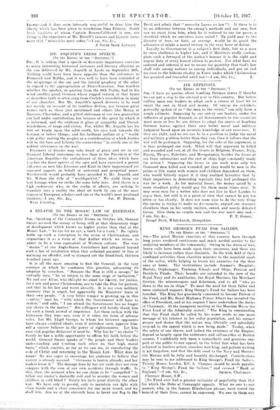MR. ASQU1TII'S LEEDS SPEECH.
(To THE Ennui Or THE SPECTATOR.") • is seldom that a speech of first-rate importance contains
e a many interesting historical instances and literary allusions as the one delivered by Mr. ,Asquith at Leeds on September 26th. Nothing could have been more apposite than the references to Bismarck and Moltke, and it was well to have been reminded of the misgivings of the oue and the fateful prophecy of the other in regard to the appropriation of Alsace-Lorraine. One wonders whether the speaker, in quoting from the 46th Psalm, had in his mind another great German whose rugged version of that hymn at dauntless faith is often sung from Carlyle's translation in many of our churches. But Mr. Asquith's speech deserves to be read not merely on account of its faultless diction, nor because great names such as those just mentioned and others like Henry of .Navarre, Clarendon, end a gifted statesman of our own generation are laid under contribution, but because of the spirit by which it ie informed, and the evidence it gives of sympathy and liberal- mindedness, of range and vision. For, whilst Mr. Asquith has his feet set firmly upon the solid earth, his eyes look towards the horizon of better things; and his brilliaut outline of a " world- s ide polity uniting the peoples in a confederation of which Justice s ill be the base and Liberty the cornerstone " is surely one of the noblest utterances on the war.
Dreamers of dreams may take heart of grace and see in our foremost Liberal statesman—no less than in the President of the American Republic—the embodiment of those ideas which have touched the finest spirits of the ages and hare exercised a potent influence on men like Erasmus and East in their impassioned yet :mooned appeals on behalf of universal and perpetual peace. Wordsworth would probably have accorded to Mr. Asquith and Tar. Wilson the line of " world-patriot." We yield them our hest homage when we strike the same lofty note. And theirs is a tigh endeavour who, in the realm of affairs, are seeking to tyanslate into a reality the ideal set forth by one of the most Immune of European scholars and one of the world's most profound


































 Previous page
Previous page